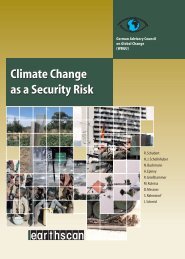RURAL BANGLADESH - PreventionWeb
RURAL BANGLADESH - PreventionWeb
RURAL BANGLADESH - PreventionWeb
You also want an ePaper? Increase the reach of your titles
YUMPU automatically turns print PDFs into web optimized ePapers that Google loves.
Socioeconomic Profile Findings<br />
Remittances are important for female-headed households, unlike male-headed households;<br />
15 percent of female-headed households depend on remittances as the primary income<br />
earning strategy. Working-age individuals residing in male-headed households on the other<br />
hand have a more diverse livelihood portfolio. Forty-five percent sell their labour as the<br />
primary income strategy; another 26 percent engage in agricultural production on their own<br />
land or through sharecropping or other arrangements, and 16 percent are involved in<br />
business ventures, which normally translate into small business enterprises, trading, or small<br />
shops. Male manual labourers tend to receive 50 to 100 percent higher wages than do<br />
female manual labourers.<br />
Table 42: Household Members’ Primary Income Strategy by WFP Priority Zone<br />
% within WFP priority zone<br />
Manual Labor<br />
Agriculture<br />
Govt. or private job<br />
Remittances<br />
Trading/ Business<br />
Skilled labor<br />
Other<br />
N<br />
Household members (age >15 years) primary income strategy<br />
WFP priority zone<br />
CHT Coastal Drought N/W Char Haor Total<br />
24.3% 36.0% 39.2% 39.6% 43.8% 30.6% 38.2%<br />
54.0% 23.1% 35.9% 30.5% 21.6% 34.3% 30.3%<br />
7.4% 6.1% 3.3% 7.8% 7.6% 7.8% 6.7%<br />
.2% .5% .9% .2% .3% .8% .5%<br />
10.0% 25.3% 10.8% 16.1% 15.2% 15.8% 15.0%<br />
3.2% 7.6% 8.5% 5.9% 10.9% 9.8% 8.6%<br />
.9% 1.4% 1.3% .5% .8% .7%<br />
783 535 656 559 510 545 3588<br />
Data disaggregated by WFP priority zone indicate the importance of manual labour and<br />
agricultural production across the six programming zones. Nearly half of the Char<br />
population (44 percent) depend on manual labour, which is the most important livelihood<br />
strategy in Coastal, Drought, and Northwest zones as well. On the other hand, less than a<br />
quarter of the CHT population (24 percent) sell labour. A significantly larger proportion of<br />
CHT population (54 percent) continue to depend on agriculture, which has declined in<br />
importance in other regions, particularly in the Char and Coastal zones, where<br />
landownership inequalities have increased most dramatically in recent decades. Trading and<br />
business opportunities are prominent in the Coastal zone, where more than a quarter of<br />
working age individuals depend on fry trading (12 percent of the working age population)<br />
and another seven percent are involved in other small business initiatives. In contrast, only<br />
10 percent of CHT income earners and 11 percent of Drought adult household members are<br />
involved in business activities. Small business activities elsewhere are usually related to<br />
agricultural post-production, such as rice milling or husking, but also include weaving and<br />
marketing bamboo products, depending on the region of the country. In the CHT, some<br />
businesses revolve around the processing and marketing of forest products; local beer is<br />
produced for sale as well. Less than one percent of individuals across the six regions depend<br />
on remittances, although remittances figure prominently in female-headed household<br />
livelihood strategies (as noted above).<br />
Throughout the six rural regions, 87 percent of individuals describe having stable permanent<br />
incomes. Disaggregated data indicate that the lowest proportion of stable permanent income<br />
earners live in the CHT and Char areas (73 and 75 percent respectively); employment<br />
patterns appear most stable in the most livelihood secure Drought zone, where almost all (98<br />
75



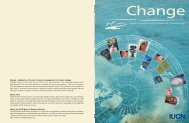
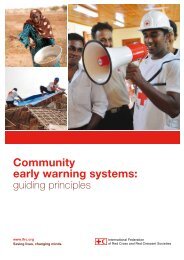
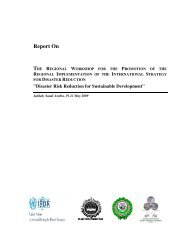
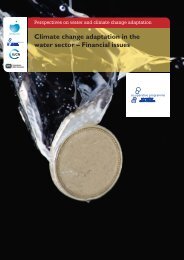
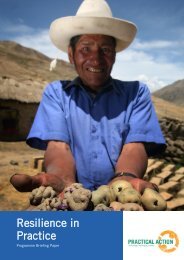
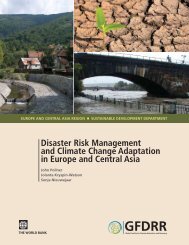
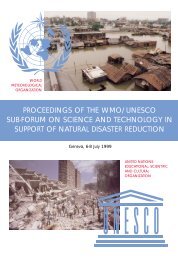
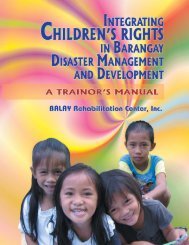
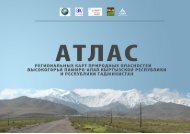
![View full document [PDF 988.55 KB] - PreventionWeb](https://img.yumpu.com/47733942/1/184x260/view-full-document-pdf-98855-kb-preventionweb.jpg?quality=85)
![View full document (in French) [PDF 4.96 MB] - PreventionWeb](https://img.yumpu.com/47223870/1/184x260/view-full-document-in-french-pdf-496-mb-preventionweb.jpg?quality=85)
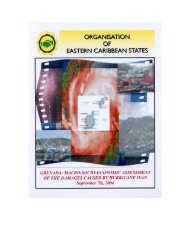
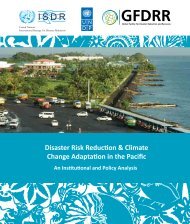
![View full document [PDF 25.02 MB] - PreventionWeb](https://img.yumpu.com/44204570/1/190x234/view-full-document-pdf-2502-mb-preventionweb.jpg?quality=85)
